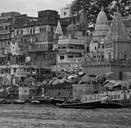
 |
Digital Conservation of Handicrafts from the State of Uttar Pardesh
With Joint Effort of Ministry of Textiles & Indian Institute of Technology Kanpur
Home History/Tradition TechniquesArtisansGalleryVideos
Varanasi (or Benares, Banaras, Kashi), on the left bank of the Ganges, is one of the seven sacred cities of the Hindus. Among the oldest continuously inhabited cities in the world, its early history is that of the first Aryan settlement in the middle Ganges valley. By late 2nd millennium BCE, Varanasi was a seat of Aryan religion and philosophy and a commercial and industrial centre famous for its muslin and silk fabrics, perfumes, ivory works, and sculpture. The capital of the kingdom of Kashi during the time of the Buddha (6th century BCE), who gave his first sermon at nearby Sarnath, it remained a centre of religious, educational, and artistic activities as attested by the celebrated Chinese traveler Hsüan-tsang, who visited it in c. 635 CE and said that the city extended for about 5 km along the western bank of the Ganges.
Varanasi declined during the early centuries of Muslim rule in India, from 1194. Its temples were destroyed and its scholars fled to other parts of India. In the 16th century, Akbar brought some relief to the city's religious and cultural activities. Setbacks came again during the reign of Aurangzeb but the Marathas later sponsored a revival. It became an independent kingdom in the 18th century; under British rule it remained a commercial and religious centre, and in 1910, the British made Varanasi a new Indian state (until 1949).
Varanasi has the finest [religious] river frontage in India, with miles of ghats (steps) for bathing; an array of shrines, temples, and palaces rises tier on tier from the bank. More than a million pilgrims visit each year; many hope to die there in old age. A center of Hindu learning through the ages, it has lots of schools and countless Brahmin pandits. Its three universities include the large and important Banaras Hindu University (1915) and over a dozen colleges. A centre of arts, crafts, music and dance, it is also famous for its production of silks and brocades with gold and silver threadwork, as well as for wooden toys, bangles made of glass, ivory work, and brassware.
| Site Under Construction |
Powered by : Gaurav Shukla , Koonal Duggal